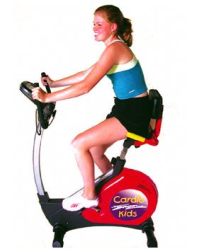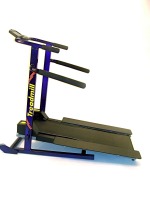POWER TO THE KIDS By Steve DeCasas
 High blood pressure, type 2 diabetes, high cholesterol, osteoarthritis and depression normally seen in adults is now being sen in teenagers and pre-teens at an alarming rate according to the Center for Disease Control and Prevention. Nearly 45% of children are either overweight or in danger of becoming over-weight. Such problems need to be addressed and we as fitness and health professionals need to step up and educate not only the parents but the kids too. Would any parent let their child play on the freeway?, because we understand the risks. Kids today have developed some risky habits that put them in as much danger as if they were playing on the freeway. Children are less active at home and school and are eating more junk food than ever. Parents need to lead the battle against childhood obesity but unless properly informed they could do maore harm than good. Parents are pressed for time and the conveniences of fast food and pre-packaged foods are a huge draw. The quality of food is compromised in the name of saving time. Couple this with the decrease in activity of kids today and we have a time bomb waiting to go off. As a fitness professional I feel the need to help kids be more aware that what they are doing today will effect them in the future. Parents also need to understand the importance of their position and guide their children to be healthier and happier.
High blood pressure, type 2 diabetes, high cholesterol, osteoarthritis and depression normally seen in adults is now being sen in teenagers and pre-teens at an alarming rate according to the Center for Disease Control and Prevention. Nearly 45% of children are either overweight or in danger of becoming over-weight. Such problems need to be addressed and we as fitness and health professionals need to step up and educate not only the parents but the kids too. Would any parent let their child play on the freeway?, because we understand the risks. Kids today have developed some risky habits that put them in as much danger as if they were playing on the freeway. Children are less active at home and school and are eating more junk food than ever. Parents need to lead the battle against childhood obesity but unless properly informed they could do maore harm than good. Parents are pressed for time and the conveniences of fast food and pre-packaged foods are a huge draw. The quality of food is compromised in the name of saving time. Couple this with the decrease in activity of kids today and we have a time bomb waiting to go off. As a fitness professional I feel the need to help kids be more aware that what they are doing today will effect them in the future. Parents also need to understand the importance of their position and guide their children to be healthier and happier. 
The saving of "Generation XXL" has to start with the parents. The California Department of Education fund that the fittest students in the state scored best on academic tests. The fact is the fitter the child, the better their brain works, according to research done on elementary children at the University of Illinois at Champaign-Urbana. Charles H. Hillman, Ph. D., the study's lead author found physically fit kids had a greater P3 amplitude, a measurement of brain actvity related to memory and focus. They also found that they had faster P3 latency meaning they were able to process information faster. Arizona State University researchers upon reviewing 44 studies examining the relationship between pohysical activity and cognition in children of varying ages, found that the youngest kids (grades 1-5) improved cognitive development the most, followed by middle school students.

Students who enter high school overweight have only a slight chance of reaching a normal weight by adulthood, according to research done at the Baylor College of Medicine. On the other hand, high school freshmen at healthy weights were four times more likely to stay slim as adults. Ideally we need to start with the kindergartners and first graders, mainly because there is no fear of failure. Somewhere between first and third grade kids become more conscious of their bodies and what people think.
Weight lifting develops strength and raises your metabolic rate and kids show improvement almost immediately giving them a confidence boost they need to continue to improve on other aspects of their fitness such as aerobic activity. In every study I have seen and according to the National Strength and Conditioning Association, the only workouts that changed body composition on young children included some type of strength exercises. The years before adolescence are a critical time for kids to build strong bones. Wayne Westcott, Ph.D., fitness research director at the South Shore YMCA in Qunicy, Massachusetts found that nine year-olds who did strength training with dumb bells and resistance bands three days a week developed four times more bone mass than children who were active but did not lift weights. HClubs such as Power Kids Gym, in Simpsonville, South Carolina, offer a fully equipped facility for kids to help fight against the problem of childhood obesity. Kid sized strength and cardiovascular machines give the kids a workout in their own gym similar to the gyms their parents use. Given the opportunity to start a lifetime commitment to a healthy lifestyle, children can continue this into the adult years. The development of a non-competitive environment facilitates a positive experience at a critical time in the lives of our children. Schools and clubs need to step up and address the issues of obesity and childhood inactivity. Parents need to lead by example and embrace a healthier lifestyle, if not for their sake, but for the sake of their kids.
HClubs such as Power Kids Gym, in Simpsonville, South Carolina, offer a fully equipped facility for kids to help fight against the problem of childhood obesity. Kid sized strength and cardiovascular machines give the kids a workout in their own gym similar to the gyms their parents use. Given the opportunity to start a lifetime commitment to a healthy lifestyle, children can continue this into the adult years. The development of a non-competitive environment facilitates a positive experience at a critical time in the lives of our children. Schools and clubs need to step up and address the issues of obesity and childhood inactivity. Parents need to lead by example and embrace a healthier lifestyle, if not for their sake, but for the sake of their kids.
Steve is the owner and founder of Power Kids Gym.

